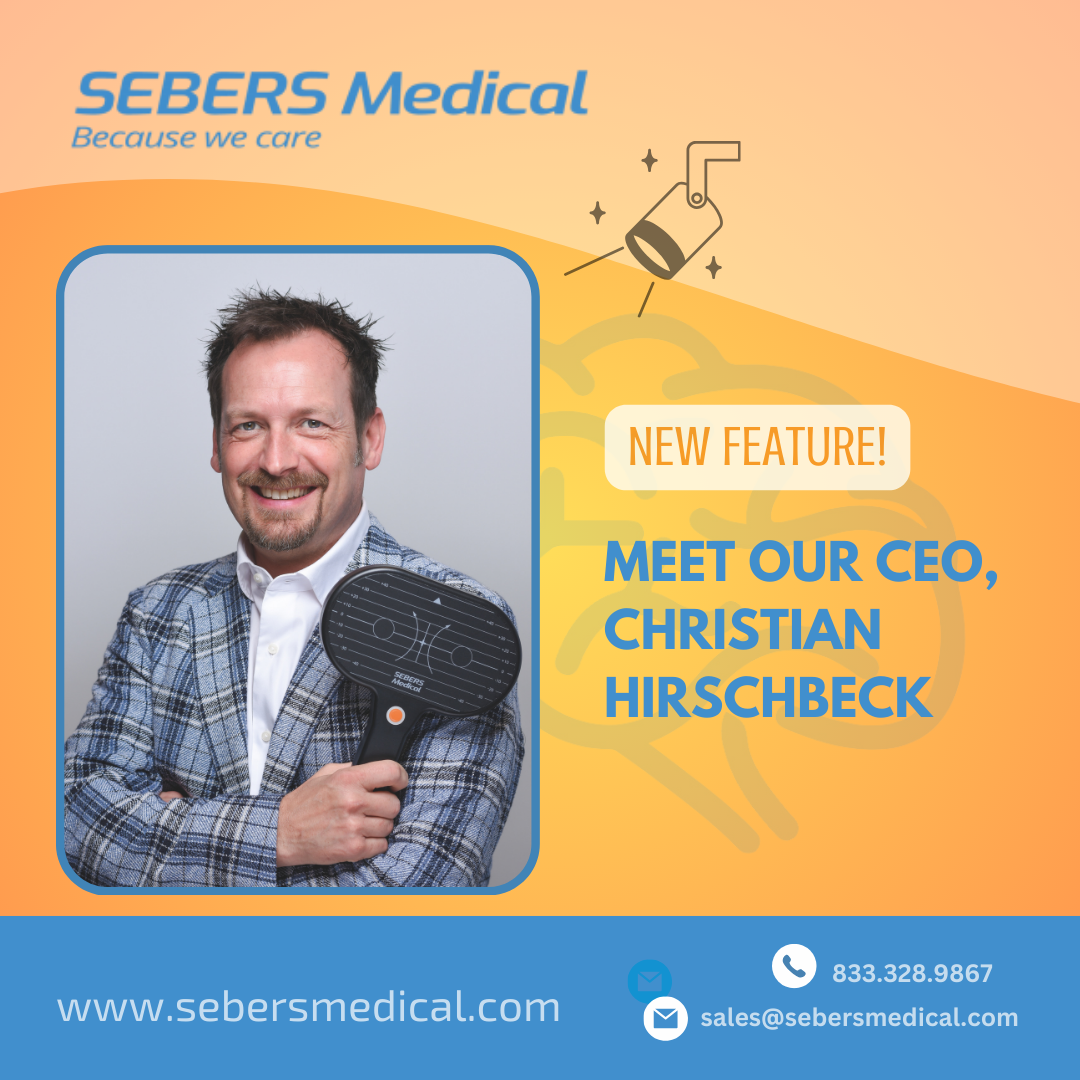Welcome to another edition of the Blossom TMS Provider Spotlight series, where we showcase key figures making waves in the TMS industry. Today, we’re excited to sit down with Christian Hirschbeck, our very own CEO at SEBERS Medical. Christian has over 15 years of experience in the field of TMS and neurostimulation, leading the way with innovative solutions like the Blossom TMS device. Let’s get to know him better and dive into his journey with TMS, his vision for the future, and the work he’s doing at SEBERS Medical.
Blossom TMS: Christian, thank you for joining us! Can you tell us how you first got involved with TMS?
Christian Hirschbeck:
It’s great to be here! My journey with TMS started over 15 years ago when I was working for a neurophysiology company. We had a joint venture with a TMS startup, and that’s where I had my first contact with the technology. I was managing parts of product development for EEG solutions at the time, and we began exploring the combination of EEG and EMG with TMS. We were part of the manufacturing of the first German-made TMS stimulator on the market, and from there, we helped establish TMS in Germany.
Blossom TMS: What drew you to TMS as a field?
Christian Hirschbeck:
What attracted me to TMS was its potential to not only diagnose but also treat patients. In neurophysiology, most of the focus is on diagnosis, but TMS opened up the possibility of actually helping patients improve their quality of life. That was a major factor for me. Being able to not only identify problems but provide a solution really stood out.
Blossom TMS: What is your technical background, and how did that play a role in developing TMS technology?
Christian Hirschbeck:
I’m an electrical engineer by training, originally from Austria. My early career was in telecommunications, but I transitioned to neurostimulation and eventually became focused on sales and marketing. My technical background helps me understand the mechanics behind TMS devices, which has been invaluable as we’ve developed the Blossom TMS machine. While today’s devices are much more advanced than the older models, that engineering knowledge is still a huge advantage.
Blossom TMS: How did the Blossom TMS device come about?
Christian Hirschbeck:
The Blossom TMS device was born out of a desire to make TMS more accessible and easier to use in clinical settings. Many devices on the market are research-focused, with too many complicated controls. We wanted to create a streamlined, easy-to-use device that could be widely adopted by clinicians. That’s where our slogan, “We Make TMS Easy,” comes from. I firmly believe that simplicity is the key to making TMS a go-to treatment.
Blossom TMS: What makes the Blossom TMS device stand out from others on the market?
Christian Hirschbeck:
One of the biggest differentiators is our coil cooling system. We partnered with a Korean company, REMED, to ensure that we had the most reliable coil cooling on the market. Oil cooling, in particular, is key for performance and longevity, allowing our machines to run all day without overheating. Most devices use air cooling, which doesn’t perform as well, especially in warmer climates. Our oil-based cooling system ensures that the Blossom TMS is reliable, low maintenance, and incredibly efficient.
Blossom TMS: What’s your vision for the future of TMS?
Christian Hirschbeck:
I see TMS evolving beyond just mental health treatments. While depression treatment is currently the most common use, I believe that TMS has huge potential in neurology, particularly in areas like stroke rehabilitation and pain management. In the future, I think TMS could become a standard tool in hospitals worldwide, just like EEG and EMG devices. At SEBERS Medical, we’re already working on expanding TMS applications to include neurology.
Blossom TMS: You’ve worked hard to make the Blossom TMS device affordable. Why is that important to you?
Christian Hirschbeck:
Affordability is crucial if we want to see TMS become more widely used. At SEBERS Medical, we’re a privately owned company, so we don’t have investors pressuring us to inflate prices. We can focus on creating high-quality devices at reasonable prices. I don’t think that machines costing over $100,000 are the future of TMS. Devices like the Blossom TMS, which are priced around $50,000, will help make TMS more accessible to clinicians and, in turn, more available to patients.
Blossom TMS: What challenges do new TMS providers face, and how does SEBERS Medical help?
Christian Hirschbeck:
New providers face two main challenges: technical concerns and business operations. On the technical side, we ensure that our machines are low-maintenance with no hidden fees like pay-per-use charges. On the business side, we offer extensive support, from training on how to use the machines to guidance on coding, insurance reimbursement, and even marketing. Our goal is to make the transition into offering TMS as seamless as possible for clinics.
Blossom TMS: Finally, what’s next for SEBERS Medical and the Blossom TMS device?
Christian Hirschbeck:
We’re constantly looking for ways to innovate and improve. We’re working on expanding the clinical applications of TMS while maintaining the affordability and ease of use that we’ve become known for. We believe that the future of TMS is bright, and we’re excited to be part of that journey. At SEBERS Medical, we’re committed to making TMS more accessible to people around the world.
That wraps up our conversation with Christian Hirschbeck, CEO of SEBERS Medical. His passion for advancing TMS technology is clear, and his vision for making TMS accessible, affordable, and effective is driving the next phase of growth for SEBERS Medical and the Blossom TMS device. Stay tuned for more updates as we continue to lead the way in TMS innovation!
